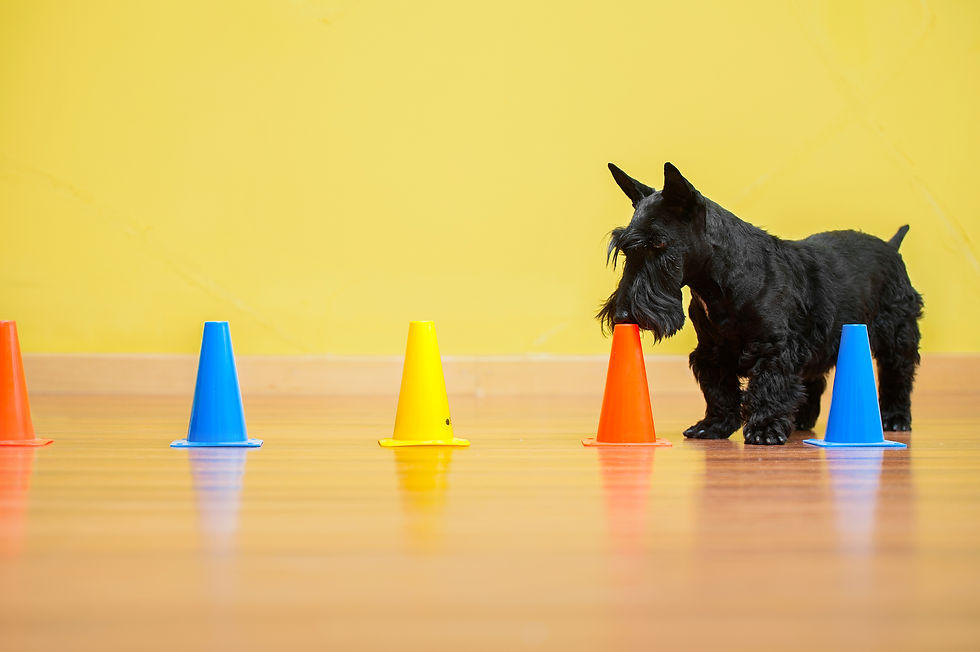Dog Dental Care
- michael raff
- Nov 7, 2023
- 3 min read
We humans follow instructions to brush our teeth at least twice a day, but for most of us, dental care for our dogs involves scheduling an annual cleaning at the vet once a year. There is a lot more we can be doing to help care for our dog's teeth, gums and overall dental health on a regular basis at home. Brushing your dog's teeth may seem daunting, but with just a little patience and practice it is a fairly simple care routine to establish with your dog.

Why does dental care matter?
It's not just about making sure Fido has pretty pearly whites when he smiles for a photo. Dental diseases or problems can be quite painful for your dog and can have far reaching impacts beyond a dog's mouth including the kidneys, liver, and heart. The health of their mouth is directly connected to the health of their gut, which affects all other systems in their body. A dog with a painful tooth or gums may not be willing to eat or drink, play with toys or their friends which is going to affect their physical and mental well being as well as overall happiness.
What to use
Here are a few dental products to consider trying for your dog to help minimize the formation of plaque and tartar in between their veterinary dental cleanings.
Canine Toothpaste: NEVER use human toothpaste for dogs. The fluoride and foaming agents are not good for your dog to ingest and xylitol (a common flavor additive) is highly toxic to dogs.
Dog specific toothpaste will have ingredients that are safe for your dog to just swallow as you brush, that will smell and taste appealing to a dog, and that are designed to coat and continue working on teeth and gums after you finish brushing.

We really like the simple ingredients in Vets Best Toothpaste for our own dogs and they really like the flavor (even without any beef, chicken, etc. flavor added!)

Friends have reported a dramatic improvement in their dog's breath and tartar buildup after using Bark Bright Toothpaste and putting it on the chews that are sold with it.
Toothbrushes: There are many different shapes, styles and sizes of dog toothbrushes. Options range from fabric or silicone finger brushes to full sized soft bristled toothbrushes. We find it easier to reach all teeth using a finger brush, rather than a standard long handled toothbrush. Pick the style that you are comfortable using, one that can fit in your dog's mouth, and something your dog does not mind you using.
Watch this short video with tips on how to brush your dog's teeth:
Alternatives
If you really can't teach your dog to calmly accept toothbrushing, there are still plenty of options for improving their dental health at home.
Dental Chews: Many companies like Greenies, Bark Bright, or Oravet, sell edible chews designed to support dental health when used alone or with a toothpaste. The chewing action helps break up tartar and many have ingredients designed to stay on teeth to prevent future plaque buildup. The trick is that your dog actually has to slowly chew them. Our dogs just chomp and gulp them down, so they provide little to no cleaning benefit. Chews are less thorough and effective than brushing, but they still provide some benefit if brushing won't work for you and your dog.

Water Additives: You can also add dental support formulas to your dog's water dish so long as they drink it daily. These additives contain ingredients to prevent plaque buildup and freshen breath when used daily. This is may be as easy as it gets if your dog will drink all their water every day.
The bottom line is, dental care is a critical aspect of your dog's overall health and well being. The more we can do each day to help keep their teeth in top condition in between dental cleanings at the vet, the less problems your dog will face down the line. And who doesn't want a big, happy smile full of healthy teeth?




Comments